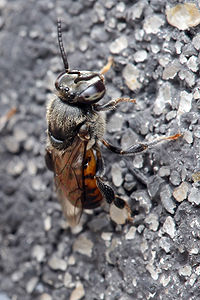
Rare and declining bee species are key to consistent pollination of wildflowers and crops across large spatial scales.
Sign Up to like & getrecommendations! Published in 2022 at "Ecology"
DOI: 10.1002/ecy.3899
Abstract: Biodiversity promotes ecosystem function in experiments, but it remains uncertain how biodiversity loss affects function in larger-scale natural ecosystems. In these natural ecosystems, rare and declining species are more likely to be lost, and function… read more here.
Keywords: declining bee; bee species; function; pollination ... See more keywords

Assessment of the vulnerability to pesticide exposures across bee species.
Sign Up to like & getrecommendations! Published in 2021 at "Environmental toxicology and chemistry"
DOI: 10.1002/etc.5150
Abstract: In many countries, the Western honey bee is used as surrogate in pesticide risk assessments for bees. However, uncertainty remains in the estimation of pesticide risk to non-Apis bees because their potential routes of exposure… read more here.
Keywords: vulnerability pesticide; honey; pesticide; bee species ... See more keywords

Anthropogenic landscapes support fewer rare bee species
Sign Up to like & getrecommendations! Published in 2017 at "Landscape Ecology"
DOI: 10.1007/s10980-017-0592-x
Abstract: ContextThe response of rare species to human land use is poorly known because rarity is difficult to study; however, it is also important because rare species compose most of biodiversity, and are disproportionately vulnerable. Regional… read more here.
Keywords: rarity; bee species; bee; landscapes support ... See more keywords

Osmia taurus (Hymenoptera: Megachilidae): A Non-native Bee Species With Invasiveness Potential in North America
Sign Up to like & getrecommendations! Published in 2023 at "Environmental Entomology"
DOI: 10.1093/ee/nvad005
Abstract: Abstract Bees are important pollinators and are essential for the reproduction of many plants in natural and agricultural ecosystems. However, bees can have adverse ecological effects when introduced to areas outside of their native geographic… read more here.
Keywords: bee species; taurus; north america; non native ... See more keywords

Local habitat type influences bumble bee pathogen loads and bee species distributions.
Sign Up to like & getrecommendations! Published in 2023 at "Environmental entomology"
DOI: 10.1093/ee/nvad027
Abstract: Bumble bees (Hymenoptera: Apidae, Bombus Latreille) perform important ecological services in both managed and natural ecosystems. Anthropogenically induced change has altered floral resources, climate, and insecticide exposure, factors that impact health and disease levels in… read more here.
Keywords: bee species; bumble bee; habitat; habitat type ... See more keywords

Plant Selection by Bumble Bees (Hymenoptera: Apidae) in Montane Riparian Habitat of California
Sign Up to like & getrecommendations! Published in 2020 at "Environmental Entomology"
DOI: 10.1093/ee/nvz159
Abstract: Abstract Many bumble bee species (Bombus Latreille) have declined dramatically across North America and the globe, highlighting the need for a greater understanding of the habitat required to sustain or recover populations. Determining bumble bee… read more here.
Keywords: bee species; bumble bee; plant; plant selection ... See more keywords

Behavioral responses of the small hive beetle, Aethina tumida, to odors of three meliponine bee species and honey bees, Apis mellifera scutellata
Sign Up to like & getrecommendations! Published in 2018 at "Entomologia Experimentalis et Applicata"
DOI: 10.1111/eea.12700
Abstract: Recent studies have shown that honey bees, bumble bees, and some meliponine bee species of the genera Trigona, Meliponula, and Dactylurina are hosts of the small hive beetle (SHB) Aethina tumidaMurray (Coleoptera: Nitidulidae), a pest… read more here.
Keywords: meliponine bee; bee species; bee; honey bees ... See more keywords

Taxonomy of the bee species Anthrenoides nigrinasis (Vachal, 1909) n. comb.: redescription of the type, description of the female, and new distribution records (Hymenoptera: Apoidea).
Sign Up to like & getrecommendations! Published in 2018 at "Zootaxa"
DOI: 10.11646/zootaxa.4378.2.8
Abstract: Protandrenini includes approximately 420 species of short-tongued bees, which are exclusively distributed in the Americas (Michener 2007; Moure et al. 2007; Ascher Pickering 2017). Members of this tribe are mostly found in xeric and temperate… read more here.
Keywords: michener 2007; species anthrenoides; moure 2007; bee species ... See more keywords

A new bee species of the genus Dasypoda Latreille (Hymenoptera, Apoidea) from Northwest Africa with comparative remarks on the subgenus Microdasypoda Michez.
Sign Up to like & getrecommendations! Published in 2022 at "Zootaxa"
DOI: 10.11646/zootaxa.5188.1.4
Abstract: North Africa, with its vast array of ecosystems and reliefs, constitutes a remarkable place to explore and describe the diversity of wild bees. In this paper, a new bee species of the genus Dasypoda Latreille… read more here.
Keywords: bee species; new bee; dasypoda latreille; genus dasypoda ... See more keywords

Patterns of orchid bee species diversity and turnover among forested plateaus of central Amazonia
Sign Up to like & getrecommendations! Published in 2017 at "PLoS ONE"
DOI: 10.1371/journal.pone.0175884
Abstract: The knowledge of spatial pattern and geographic beta-diversity is of great importance for biodiversity conservation and interpreting ecological information. Tropical forests, especially the Amazon Rainforest, are well known for their high species richness and low… read more here.
Keywords: orchid bee; diversity; turnover; bee species ... See more keywords

Comparing bee species responses to chemical mixtures: Common response patterns?
Sign Up to like & getrecommendations! Published in 2017 at "PLoS ONE"
DOI: 10.1371/journal.pone.0176289
Abstract: Pollinators in agricultural landscapes can be exposed to mixtures of pesticides and environmental pollutants. Existing mixture toxicity modelling approaches, such as the models of concentration addition and independent action and the mechanistic DEBtox framework have… read more here.
Keywords: toxicity; mixture; bee species; response patterns ... See more keywords